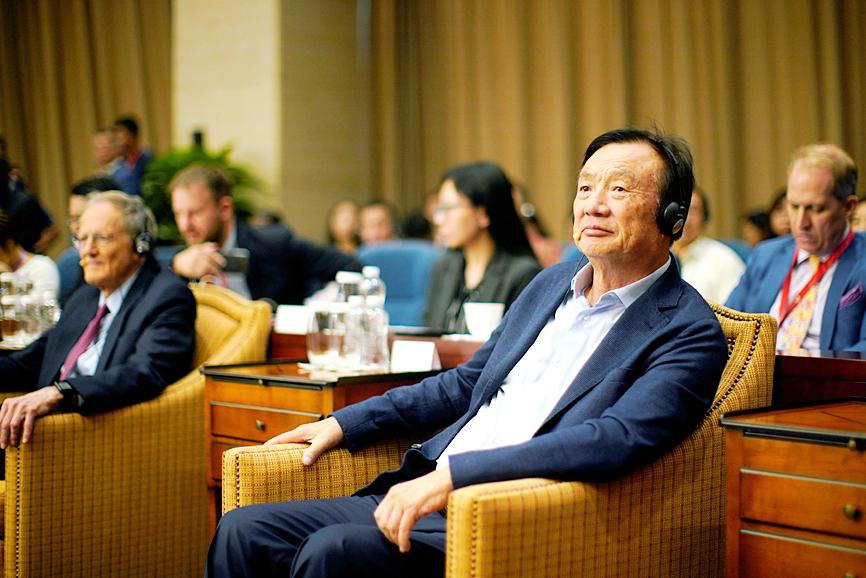Huawei Technologies Co (華為) founder Ren Zhengfei (任正非) called the sale of its Honor (榮耀) budget smartphone division a “clean break” that should free it from US restrictions and create a new powerhouse in the world’s largest mobile arena.
Ren told employees in a memo that Honor would rapidly resume production after regaining access to US circuitry and software, after US President Donald Trump imposed restrictions on supply of US-made technology to Huawei.
His missive came days after Huawei unveiled a deal to sell the business to a consortium of more than 30 Chinese corporations, assembled by Beijing-backed Shenzhen Smart City Technology Development Group Co (深圳智慧城市科技發展集團).

Photo: Reuters
“Facing wave upon wave of attacks from the US, we finally realized that American officials weren’t trying to fix us. They were seeking to kill us,” Ren said. “Once we’re divorced, there’ll no longer be any under-the-table relations with Honor. We’re handling the separation in an adult manner, and will rigorously adhere to regulations and international norms.”
Huawei’s leader appeared to be addressing uncertainty over whether the spinoff would trigger a resumption of US chip supply to Honor under new ownership or if there are US regulatory steps required first.
Citing national security concerns, the US has waged a far-ranging campaign against Huawei since 2018 that landed its chief financial officer under house arrest in Canada and fomented bans against the use of the company’s 5G equipment in countries from the UK to Japan.
The final blow came when the White House enacted sweeping restrictions against suppliers this year, closing off loopholes that let Huawei procure ready-made semiconductors to keep its consumer business afloat.
Honor was an integral part of Huawei’s smartphone business, once larger than Samsung Electronics Co’s, but now struggling to secure enough crucial components and software for production.
Access to US technology would breathe new life into a brand that has gained popularity among younger budget-conscious users in recent years and made headway in overseas markets such as Europe.
It could create a rival to the likes of Xiaomi Corp (小米) and Oppo Mobile Telecommunications Corp (歐珀), who compete in the same price segments.
The sale illustrated the uneven impact of White House sanctions on China’s largest technology company, whose consumer business is ailing even as its networking unit soldiers on.
Shenzhen-based Huawei is said to have safeguarded its core telecom equipment business by stockpiling critical components to continue supplying its home country’s 5G rollout through at least next year.
Honor’s new owners include local city-backed corporations such as Shenzhen Expressway and Shenzhen Energy. It can also lean on Suning.com Co (蘇寧易購), the country’s largest electronics chain backed by Alibaba Group Holding Ltd (阿里巴巴), to help enhance distribution.
“Under its new leadership, Honor will very quickly resume production and resolve issues affecting its upstream and downstream partners,” Ren said in his memo. “The US is a technology superpower that has many excellent companies. You should firmly and boldly work with them.”

Taiwanese suppliers to Taiwan Semiconductor Manufacturing Co. (TSMC, 台積電) are expected to follow the contract chipmaker’s step to invest in the US, but their relocation may be seven to eight years away, Minister of Economic Affairs J.W. Kuo (郭智輝) said yesterday. When asked by opposition Chinese Nationalist Party (KMT) Legislator Niu Hsu-ting (牛煦庭) in the legislature about growing concerns that TSMC’s huge investments in the US will prompt its suppliers to follow suit, Kuo said based on the chipmaker’s current limited production volume, it is unlikely to lead its supply chain to go there for now. “Unless TSMC completes its planned six

Intel Corp has named Tasha Chuang (莊蓓瑜) to lead Intel Taiwan in a bid to reinforce relations between the company and its Taiwanese partners. The appointment of Chuang as general manager for Intel Taiwan takes effect on Thursday, the firm said in a statement yesterday. Chuang is to lead her team in Taiwan to pursue product development and sales growth in an effort to reinforce the company’s ties with its partners and clients, Intel said. Chuang was previously in charge of managing Intel’s ties with leading Taiwanese PC brand Asustek Computer Inc (華碩), which included helping Asustek strengthen its global businesses, the company

Power supply and electronic components maker Delta Electronics Inc (台達電) yesterday said second-quarter revenue is expected to surpass the first quarter, which rose 30 percent year-on-year to NT$118.92 billion (US$3.71 billion). Revenue this quarter is likely to grow, as US clients have front-loaded orders ahead of US President Donald Trump’s planned tariffs on Taiwanese goods, Delta chairman Ping Cheng (鄭平) said at an earnings conference in Taipei, referring to the 90-day pause in tariff implementation Trump announced on April 9. While situations in the third and fourth quarters remain unclear, “We will not halt our long-term deployments and do not plan to

The New Taiwan dollar and Taiwanese stocks surged on signs that trade tensions between the world’s top two economies might start easing and as US tech earnings boosted the outlook of the nation’s semiconductor exports. The NT dollar strengthened as much as 3.8 percent versus the US dollar to 30.815, the biggest intraday gain since January 2011, closing at NT$31.064. The benchmark TAIEX jumped 2.73 percent to outperform the region’s equity gauges. Outlook for global trade improved after China said it is assessing possible trade talks with the US, providing a boost for the nation’s currency and shares. As the NT dollar